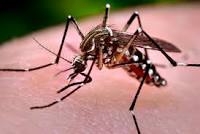End-game for dengue as Indian scientists develop herbal remedy
09 Mar 2016
Indian scientists have developed an effective herbal medicine for the treatment of dengue, in what could be a potent remedy to the disease that affects millions of people within the country and across the world.
 India accounts for 50 per cent of the population estimated to be at risk from the disease across the globe.
India accounts for 50 per cent of the population estimated to be at risk from the disease across the globe.
The herbal medicine was jointly developed by the Department of Biotechnology (DBT), under the ministry of science and technology, the International Centre for Genetic Engineering and Biotechnology and Ranbaxy Research Laboratory (now owned by Sun Pharma), using entirely ayurvedic process and procedures.
"The drug has proved to be resistant to four types of dengue virus."
"Sun Pharma has been tasked with launching the drug commercially after conducting the trials," Mohamad Aslam, a senior advisor to DBT, said, adding that the company has patents in 17 countries where cases of dengue are high.
Since the drug has been made from plant extracts and not chemicals, it has sought permission from both the ministry of Ayush and the Drug Controller of India, he added.
Dengue, a mosquito-borne viral disease, is more prevalent in tropical countries such as India, where periodic dengue outbreaks can be correlated to the high prevalence of the mosquito vector circulation of all four dengue viruses (DENVs) and the high population density.
A drug for the treatment of dengue is being increasingly recognised as an unmet public health need.
Navin Khanna, senior scientist at ICGEB and group leader of the project, said, "Using the knowledge of traditional Indian medicine - Ayurveda - we developed a systematic bio-assay-guided screening approach to explore the indigenous herbal bio-resource to identify plants with pan-DENV (dengue virus) inhibitory activity.
"Results showed that the alcoholic extract of Cissampelos pariera Linn (Cipa extract) was a potent inhibitor of all four DENVs in cell-based assays, assessed in terms of viral NS1 antigen secretion using ELISA, as well as viral replication, based on plaque assays. Virus yield reduction assays showed that Cipa extract could decrease viral titers by an order of magnitude. The extract conferred statistically significant protection against DENV infection, ''he added.
Preliminary evaluation of the clinical relevance of Cipa extract showed it had no adverse impact on platelet count and RBC viability. It also showed no evidence of toxicity in Wistar rats, when administered doses as high as 2g/Kg body weight for up to a week, he pointed out.


















